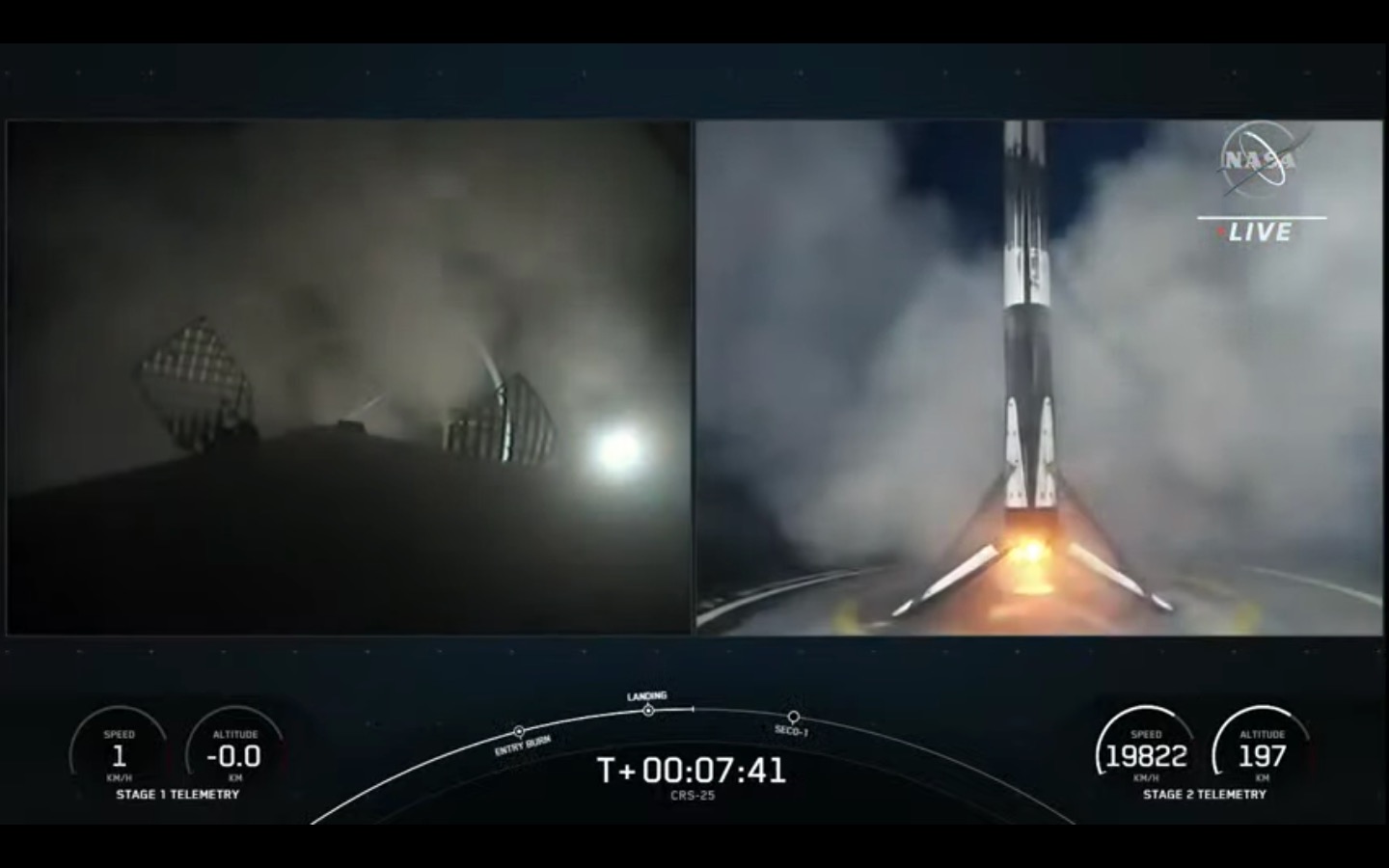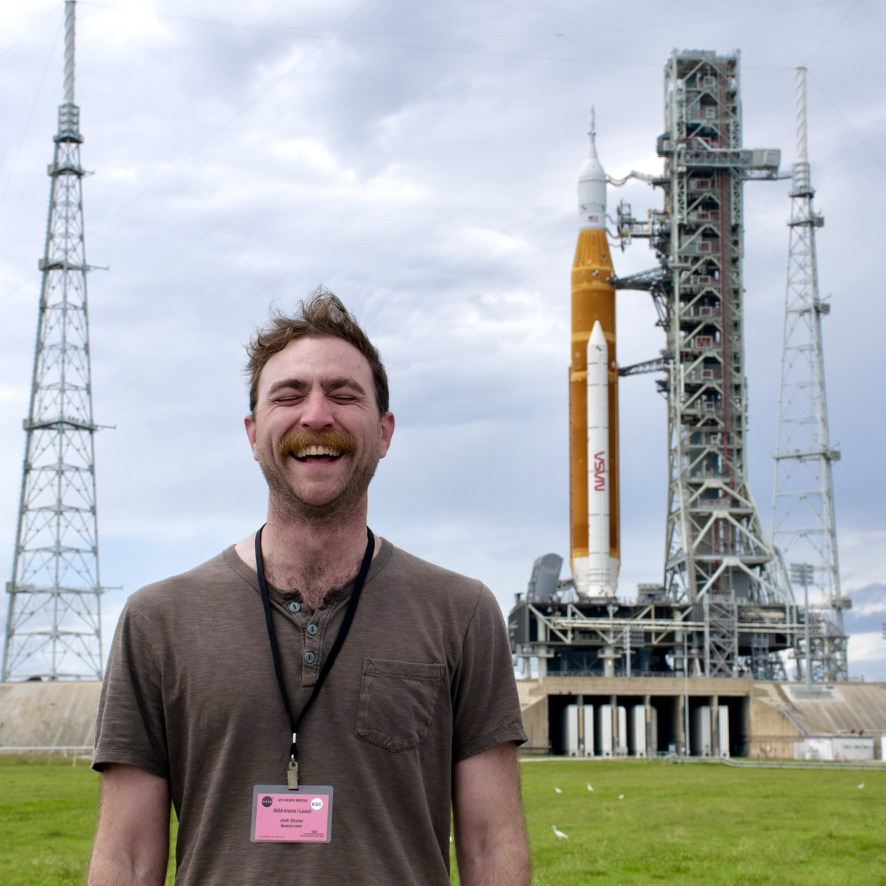Dragon capsule launches on SpaceX's 25th cargo mission to the space station
The uncrewed Dragon is scheduled to dock with the space station on Saturday morning (July 16).
A SpaceX Falcon 9 rocket launched from NASA's Kennedy Space Center (KSC) in Florida this evening (July 14), sending a robotic Dragon resupply craft toward the International Space Station (ISS).
The mission, known as CRS-25, lifted off tonight at 8:44 p.m. EDT (0044 GMT on July 15) from KSC's Launch Complex 39A. The two stages of the Falcon 9 separated 2.5 minutes into flight. As the rocket's second stage propelled Dragon into orbit, the main booster began its return to Earth, safely landing on SpaceX's A Shortfall of Gravitas droneship in the Atlantic Ocean about 7.5 minutes after launch.
The Dragon will spend the next day and a half catching up to the ISS. The cargo capsule is scheduled to dock with the orbiting lab around 11:20 a.m. EDT (1520 GMT) on Saturday morning (July 16).
Related: 8 ways that SpaceX has transformed spaceflight

CRS-25 was initially slated to launch over a month ago, but the liftoff was delayed after high levels of hydrazine vapor were detected in part of Dragon's propulsion system during fueling operations. Hydrazine is used by Dragon's Draco thrusters and is highly corrosive to components not designed to interact with the fuel. NASA and SpaceX therefore took a cautious approach, putting the vehicle through extensive examinations following the vapor detection, ultimately pushing the launch back three times over several weeks.
In a statement released on June 28, NASA cited "ongoing Dragon spacecraft inspections as well as repair and replacement of any components that could have degraded by exposure to mono-methyl hydrazine (MMH) vapor found during testing in early June," as the reason for the string of delays. SpaceX teams also replaced the vehicle's main parachutes in order to give the potentially affected parachute a more in-depth inspection.
The senior director of SpaceX's human spaceflight program, Benjamin Reed, joined a call with press Wednesday evening (July 13), and voiced optimism for preliminary tests the parachutes have undergone. "So far, the initial results of some inspections are coming in, and the original parachutes look great," Reed said. "[SpaceX] will likely use those on a future mission if the team determines they're safe to use for flight," he added.
Get the Space.com Newsletter
Breaking space news, the latest updates on rocket launches, skywatching events and more!
CRS-25 will deliver over 5,800 pounds (2,630 kilograms) of science and supplies to the space station, including equipment in support of nearly 40 ongoing research investigations. Current ISS residents can also look forward to a fresh food delivery, according to ISS deputy program manager Dana Weigel, who joined Wednesday's call. Weigel listed a variety of produce and other items stowed away inside Dragon.
"We're sending up apples, oranges, cherry tomatoes, some onion, baby carrots, garlic, tahini, cheese and dry sausage," Weigel said. "So, a really nice mix of fresh fruit for the crew."
By weight, science equipment comprises roughly half of CRS-25's total cargo. One of the mission's big experiments — both in physical size and in project scope — is the Earth Surface Mineral Dust Source Investigation (EMIT). The device is catching a ride in Dragon's trunk and is about the size of a kitchen oven. EMIT will be added to the ISS as an external payload and will be used to measure the mineral composition of dust in the planet's driest regions, NASA officials have said.
EMIT will focus on how the dust from some of Earth's arid landscapes is carried on winds across the globe, adding to the planet's overall climate system in ways not yet fully understood. Measuring the minerals in these samples will help scientists better understand their composition and role in global climate, ultimately contributing to things like weather pattern predictions, improved crop yields and other climate research.
Climate change: Causes and effects
NASA's associate ISS scientist, Heidi Parris, said that scientists currently have access to about 5,000 such measurements. "They are looking to increase our current measurement set … to somewhere close to 1 billion measurements," Parris said on Wednesday's press call. EMIT "really has the potential to close the gap in our understanding of Earth climate models."
Other experiments on their way to the orbital lab include a biopolymer concrete investigation to study the building material's formation in microgravity using "in situ" resources comparable to lunar regolith or Martian dust. Another study, known as the immunosenescence investigation, will study the effects of aging on cells' ability to repair tissues in the body and the possibility of reversing those effects in astronauts post-spaceflight.
CRS-25 — so named because it's the 25th cargo mission that SpaceX has launched for NASA — is scheduled to remain docked at the ISS for 33 days. The spacecraft will return to Earth with nearly as much cargo as it was sent up with. Samples and equipment from up to 50 research investigations, as well as waste and other circulated station lifecycle supplies, will be stowed aboard Dragon before the vehicle's ISS departure.
The Dragon will also haul home a spacesuit worn by European Space Agency astronaut Matthias Maurer. The suit experienced a water leak during a spacewalk, or extravehicular activity (EVA), that Maurer took on March 23 of this year.
"That'll be part of what we need for our assessment for our eventual readiness when we look at returning back to nominal EVAs," Weigel said in Wednesday's call.
Both of the vehicles that launched tonight were spaceflight veterans. CRS-25 is this Dragon capsule's third ISS cargo mission, and the Falcon 9's first stage had flown five times before tonight.
Follow us on Twitter @Spacedotcom or on Facebook.
Join our Space Forums to keep talking space on the latest missions, night sky and more! And if you have a news tip, correction or comment, let us know at: community@space.com.

Josh Dinner is the Staff Writer for Spaceflight at Space.com. He is a writer and photographer with a passion for science and space exploration, and has been working the space beat since 2016. Josh has covered the evolution of NASA's commercial spaceflight partnerships and crewed missions from the Space Coast, as well as NASA science missions and more. He also enjoys building 1:144-scale model rockets and human-flown spacecraft. Find some of Josh's launch photography on Instagram and his website, and follow him on X, where he mostly posts in haiku.









